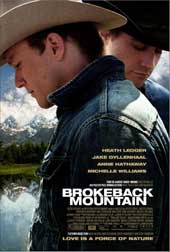 |
 |
| (Top) A poster of Brokeback Mountain and its director Ang Lee |
Beijing, April, 2: Taiwanese filmmaker Ang Lee is widely seen as a national treasure in China, but that hasn’t stopped censors here from banning Brokeback Mountain, his latest Oscar-winning film about two gay cowboys.
Just weeks ago, Lee had lauded Asia for embracing a more open-minded view of sexuality, and the China Daily, a local government-controlled newspaper, had called him the “pride of Chinese people all over the world”.
But the fact is that homosexuality is still on the list of banned subject matters for films in China, said Liu Bing Jian, a film director in Beijing, whose own award-wining film about homosexuality and blurred gender identity, Man and Woman, was banned here in 1999.
“It’s a subject the government does not like to talk about,” said Liu. “There’s no doubt our society has developed a more open attitude recently, but the fact is we have thousands of years of feudal history and this takes time to change. In that sense the government might be a bit behind the people.”
While the official decision to ban Lee’s film does seem out of step with street culture in cities, such as Beijing and Shanghai, where gay bars, magazines and websites have proliferated, it is also a bit futile. Most people in this country of lax intellectual property rights laws watch their movies on pirated DVDs and copies of Brokeback Mountain can be found in every street corner of Beijing.
Yet Chu Tian, who runs a gay rights website in Beijing, said the ban was an important indicator of how official prejudice against homosexuality was still widespread and how being gay in China was still “almost tragic” for most people, mostly because of unrelenting social pressures.
“In one sense we are lucky that unlike in Christianity or Islam or some other religions, there is no religious prejudice against homosexuality in Chinese culture,” Chu said. “But socially, the general notion here is that the primary purpose of life is to procreate. Since gay people cannot do that it puts them under great pressure from family to go straight, get married and have children.”
This has trapped Chinese homosexuals, who are estimated to number between 40 and 80 million, into living double lives with secret names and hidden rendezvous.
While the rest of the country has been going through a mini sexual revolution, Chu said most gay people in China have to hide their sexuality behind conservative clothes and a mask of benign normality. He added that such social restraints on being openly gay also prevent homosexuals from connecting easily with each other and forming meaningful relationships.
“As far as I know, there is only one gay couple in China that has been together for more than 20 years and only a few who have been together more than 10 years”, said Chu.
“Mostly people just keep meeting each other through the Internet. While it’s easier for lesbians to be together as people are used to seeing women holding hands and things like that, it’s very, very hard for men to be and live together.”
Pressures from families on gay lovers to split and marry women are also leading to a high rate of suicides in the community.
Perhaps the most significant result of preventing homosexuals from forming abiding relationships has been the spread of AIDS. This has forced the government to take notice of the problem and reach out to the gay community, Chu said, and now gays and lesbians are often on the frontline of the battle against HIV/AIDS in China.
In recent years the Chinese government has repudiated several of its anti-gay policies. For example, in 2001, homosexuality ceased to be classified as a mental disorder and when China’s parliament convened in March it even debated a law to allow gay marriage.
Though the bill was shot down, several human rights-related NGOs have begun to educate people on homosexuality, often by pointing out that the practice has existed in China since the earliest dynasties and that several Chinese emperors had male lovers.
With the Chinese government officially allowing only 24 foreign films in the country every year, Liu said he still hoped people would expand their minds by watching films like Brokeback Mountain on pirated DVDs and begin to take on a different attitude towards “deviant” sexual behaviour.
“People should see it as just a story of two people, not a story of two homosexual people,” he said. “This is my ultimate goal as a filmmaker. To understand and help others understand the lives of people unlike us.”










